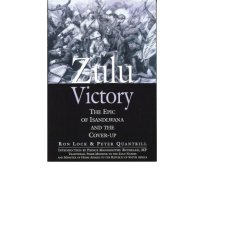
I just finished reading this book, "Zulu Victory: The Epic of Isandlwana and the Cover-Up" by Ron Lock and Peter Quantrill, a couple of fine retired British army officers. I stongly recommend it to any serious student of the Zulu War. The authors have pieced together an extremely detailed account of the sequence of events on that auspicious day of January 22nd 1879 when the British invasion of Zululand was dealt a huge set-back at Isandlwana. Here is what I think. I think this book has enough in the way of new facts and details that it makes all previous books on Isandlwana obsolete. Correct me if I'm wrong.
The authors have done such a thorough job of interrelating all the events and developments of the battle that the book can actually be considered to be difficult to read. You really have to concentrate hard on all the disparate personalities, the forces, what they were all doing and how it all came together. I learned a lot of new things about Isandlwana. My assessment is that anyone else would too.
They do a good job of explaining how the Zulus decoyed Chelmsford and a large part of his force away from the camp at Isandlwana and then held his interest until the "right hook" manuever up and around to the North could be executed by the main Zulu impi. If you somehow believed that the Zulus got lucky and caught the camp in a vulnerable position, this book will dispell that notion. I have to admit that I was under that impression.
Another thing I liked about this book was that it gives you a good apprecation for the "fog-of-war" factor that Colonels Pulleine and Durnford were dealing with. In spite of the reports coming in, neither one of them could comprehend exactly how much danger they were in until it was too late. Oh well, nothing unusual about that. First contact with the enemy is very frequently a bitter learning experience. That certainly was the case at Isandlwana. Many mistakes were made that would not be repeated. More than any other mistake Chelmsford was guilty of fighting previous wars against African tribes. The Zulus were another matter entirely, and he just had to see it before he could believe it.
Here's something else; this is the first book I have seen that covers the aftermath of Isandlwana in detail. It shows how Chelmsford was able to get through all the scrutiny with his hide somewhat intact and how Colonel Durnford, commander of the Natal Native Contingent, was offered up as a convenient scapegoat. By convenient I mean that since he was killed in the battle, he couldn't refute the blame.
No comments:
Post a Comment